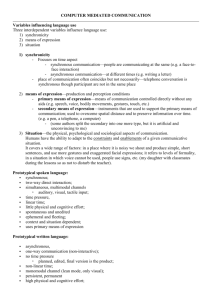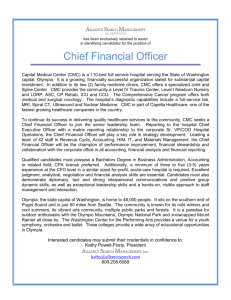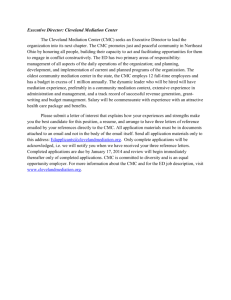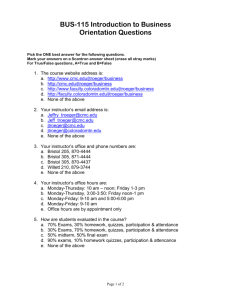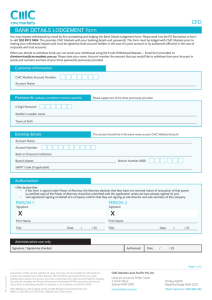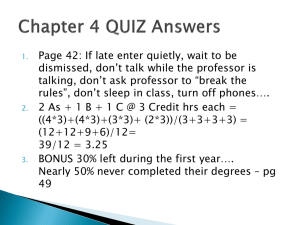Computer Mediated Communication
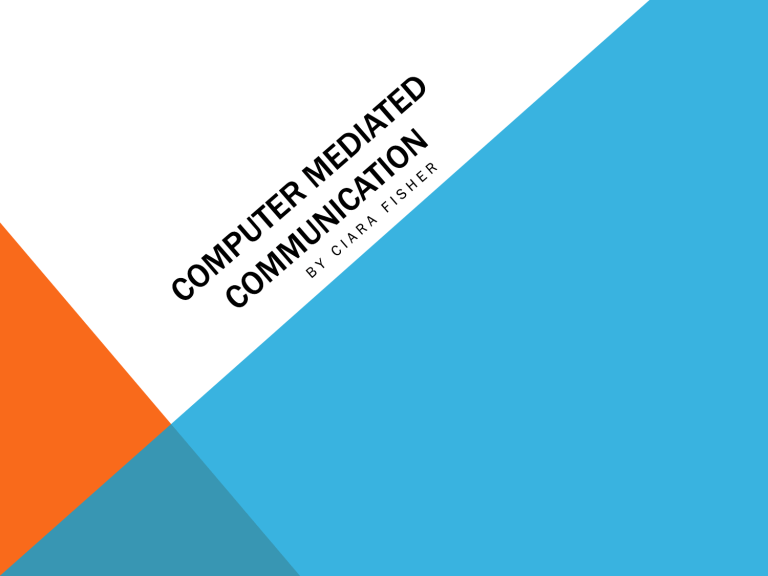
AGENDA
• Introduction to Computer Mediated Communication/What is CMC (15 min)
• Relevant Terminology (20 min)
• Characteristics of CMC
• Why is CMC important in the workplace
• Activity (5 min)
• When, Where and How? (5min)
• Differences between computer mediated and face-to-face communication
• Activity cont. (5min)
• Advantages/Disadvantages (10min)
• Summary
• Q&A
WHAT IS CMC?
Take a second and think about all the types of communication technology you have used today, yesterday, or within the last week. Have you:
• Checked your email?
• Sent a text message
• Logged in to a social network site? Facebook or Instagram?
• Updated your Twitter “tweets”?
• Read or posted to a blog?
I’m sure you are asking yourself what does this have to do with anything, but these are all examples of computer mediated communication in which messages are communicated through a technological device in this case through a smartphone or computer. With “seventy-nine percent of all American adults going online, a number that has remained steady since 2006” (Zickuhr) its safe to say that CMC is a part of life. Figure1 shows that all generations account for the seventy-nine percent that use the Internet.
RELEVANT TERMINOLOGY
Loss Of Cues The most significant way mediated communication differs from the face-toface communication. There are a reduced number of nonverbal cues that include, but not limited to:
Touch glance
Eye contact (gaze)
Volume
Vocal nuance
Gestures
Facial expression? Pause (silence)
Intonation
Posture Word choice and syntax ("What is non-verbal communication?")
Variable Synchronicity Synchronicity is the condition when communicators are all connected in real time. Face-to-face interaction is synchronous, and so are some mediated channels ("Modulating Synchronicity in Computer Mediated
Communication"). Examples of synchronous mediums are phone conversations and videoconferencing.
Asynchronous There’s a delay between the time a message is sent and when it’s received.
Examples if asynchronous are e-mails, text messages and Facebook statuses the postings have a time lag before they are read. These are also messages that one can choose to ignore.
Interpersonal and Mass Communication Nowadays it’s hard to differentiate between personal and mass communication. Facebook and Twitter have distorted this boundary. How many of your Facebook friends do you really know if you’re like me maybe half? This span of reach has led some researchers to label new technologies mass personal
CHARACTERISTICS OF CMC
Loss of social cues
Loss of coordination of communication
Anonymity Less hierarchical
Asynchronous or synchronous communication
Information processing pressures
ACTIVITY
Everyone has been given a blue index card. Everyone pull out your phones, computers or any electronic device that you may have with you Check your email, text, twitter, Instagram and Facebook. List how many messages, or update you have sent or received in the last 2 hours. How many times a day you think you use
CMC? How can you relate that to the workplace?
Hand the index card to your neighbor, compare their answers to yours are they similar?
WHY IS CMC IMPORTANT IN THE WORKPLACE
An organization cannot exist without communication, especially the type of communication to keep the employees well-informed.
Technological changes have greatly influenced the communication approaches in organizations.
New communication technologies will be introduced as a communication platform in the workplace.
CMC is a form of asynchronous communication which has eliminates problems created by barriers of time and space
Cost effective and easy to use
More personal and customizable
FIGURE 1: SEVENTY-NINE PERCENT OF ALL AMERICAN ADULTS GOING
ONLINE, A NUMBER THAT HAS REMAINED STEADY SINCE 2006 (ZICKUHR)
CMC VERSUS FACE-TO-FACE COMMUNICATION
WHEN, WHERE, AND HOW?
Similar Goals
• Whether people are using a medium to communicate or speaking in person, we are all communicating for the same reasons to gratify
Physical, Social, Identity, and Practical needs ("A First Look at
Interpersonal Communication")
Similar Processes
• The process involves communicators sending messages through channels, much like face-to-face communication ex. The noise in mediated communication might be static on a phone line or unwanted pop-up ads on websites
Similar Ideologies
• Have you ever mistakenly clicked "reply all" when sending an e-mail?
Anyone who is familiar with CMC knows that this can be unintentional, just like the occasional slip of the tongue when having a face-to-face conversation .
DIFFERENCES BETWEEN COMPUTER MEDIATED AND FACE-TO-FACE
COMMUNICATION
Loss Of Cues
• reduced number of nonverbal cues that include Touch glance, Eye contact (gaze),
Volume, Vocal nuance, Gestures, Facial expression? Pause (silence), Intonation
Posture Word choice and syntax ("What is non-verbal communication?")
Variable Synchronicity
• Synchronicity is the condition when communicators are all connected in real time.
Asynchronous
• Delay between the time a message is sent and when it’s received. (Examples if asynchronous are e-mails, text messages and Facebook statuses the postings have a time lag before they are read)
Interpersonal and Mass Communication
• How many of your Facebook friends do you really know if you’re like me maybe half? This span of reach has led some researchers to label new technologies mass personal. Figure 2. With more than 83% of adults using social networking sites its hard not to het sucked in to the hype.
FIGURE 2: CHANGES IN SOCIAL NETWORK USE, BY GENERATION
ADVANTAGES OF COMPUTER MEDIATED COMMUNICATION
Classroom Instruction
• CMC shifts the focus from the teacher's instruction and places the responsibility of learning onto the shoulders of the students.
Expanded Cultural Awareness
• Since people through the use of CMC can communicate with anyone in the world, computer mediated communication can promote increased cultural awareness
Lack of Geographic and Time Barriers
• People don't have to be physically present in order to communicate
Lack of Social Barriers
• CMC is a stress-free way of communicating this can be especially helpful to people who find communicating really difficult
DISADVANTAGES OF COMPUTER MEDIATED COMMUNICATION
Access and Compatibility
• What happens to those who do not have the money, skills to be able to use CMC?
Miscommunication / Non-verbal Cues
• It is easy to underestimate the impact of nonverbal communication until one enters into a world devoid of these cues.
Face-to-Face Human Contact
• Human contact is necessary and important It is easy to become desensitized to the real world.
Identity misrepresentation and identity distortion
• People can intentionally manage bulging waistlines, acne, and other unflattering physical characteristics are not automatically communicated online as they are during face-to-face encounters
ASSUMPTIONS
CMC is seen as impersonal and results in participants becoming uninhibited in their communications.
The being or feeling of anonymity that CMC affords can make people feel less restricted by group or social norms.
This means that it removes the non-verbal cues from communication due to the technological constraints of the Internet, thus reducing the emotional quality of the message.
Finally, CMC has negative effects on group decision-making, cohesion, and perception of members and tasks.
Consequently, CMC has become a lesser form of communication compared to faceto-face interaction and has adverse effects on group and organizational interaction.
CONCLUSION
• Due the various opinions and theories on whether CMC is more or less personal than face-to-face communication, one must recognize that the personal or impersonal qualities of CMC are not inherent to the medium.
• The personality and circumstances of the users must be taken into account when discussing the problem.
• I believe that a persons communication styles are built into him or her, and because of that the mode of communication can do little to change how he or she interacts.
SUMMARY
• Why should companies implement computer-mediated communication
• Employees should be able to communicate without barriers
• CMC is not impersonal
• In a technologically advanced society CMC is necessary
Questions?
One at a time, please raise your hand.
Thank you for attending
Contact Information:
Ciara Fisher fisher73@email.franklin.edu
REFERENCES
http://pewinternet.org/Reports/2010/Generations 2010 Introduction/Generationsonline-and-offline.asp&xgt;
"A First Look at Interpersonal Communication." Retrieved from http://www.sagepub.com/upm-data/52575_Gamble_(IC)_Chapter_1.pdf
Herring , Susan . "Computer-Mediated Discourse. “Handbook of Discourse Analysis .
Retrieved from http://www.let.rug.nl/redeker/herring.pdf
"Modulating Synchronicity in Computer Mediated Communication." Retrieved from http://www.kalmans.com/synchasynchICAsubmit.pdf
Scherba de Valenzuela, Julia. (2002)"The Transactional Model of Communication
Development."
Walther, Joseph, and Judee Burgoon. (1992)"Relational Communication in Computer-
Mediated Interaction." Relational Communication in Computer-Mediated
Interaction .
"What is non-verbal communication?." Non-Verbal Commuication Modes . http://www.andrews.edu/~tidwell/bsad560/NonVerbal.html
